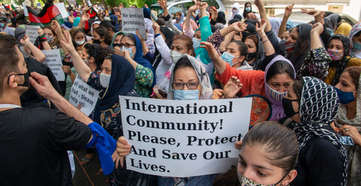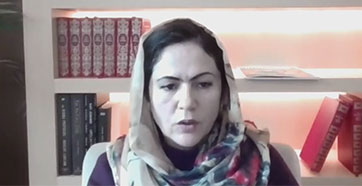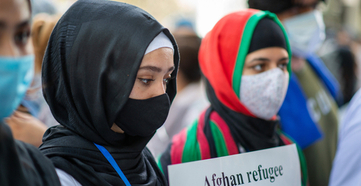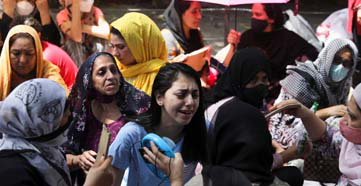Afghanistan: Schoolgirl ban is ‘gender apartheid’ and serious setback to women’s rights

School in Afghanistan. michalknitl/AdobeStock.com
As in most countries, the first day of the school year in Afghanistan is a flurry of activity and excitement. This year even more so, as the Taliban had announced just two days earlier that secondary schools would finally reopen for girls after a seven-month ban.
However, on 23 March Taliban leaders dramatically reversed the decision, turning girls away at the school gates pending a decision over their uniform in accordance with ‘Sharia law and Afghan tradition’.
Since the Taliban returned to power in August, its leaders have continued to stifle dissent, freedom of assembly and expression and largely excluded women from society. Gender segregation measures have been imposed in public places and women have been removed from public sector roles and many other types of employment.
Shaharzad Akbar, former chairperson of the Afghanistan Independent Human Rights Commission, says the latest U-turn is another sign that women’s rights are steadily being eroded. ‘The human rights situation in Afghanistan is catastrophic and devastating,’ she says. ‘The Taliban are implementing a gender apartheid. Women and girls are deprived of their basic human rights.’
Global Insight spoke to one Afghan judge who recently relocated to New Zealand with the help of the IBA, the International Association of Women Judges and other organisations.
She says she finds it difficult to watch what’s happening in her country and that reports of girls still being banned from secondary school bring back distressing memories from her own childhood. ‘The pain of those girls deprived of school is very familiar to me,’ she says. ‘I was in the same situation 20 years ago, but we thought it had stopped during my generation. Unfortunately, history repeated, and the Taliban closed the doors of schools to this generation. I know the Taliban’s beliefs and ideas very well. They can’t accept women as human beings anytime.’
Girls were prohibited from attending school or university during the last Taliban rule between 1996 and 2001. Akbar defied the ban by studying abroad – first at Smith College in Massachusetts and later she became the first Afghan woman to gain a master’s degree at Oxford University.
The Taliban are implementing a gender apartheid. Women and girls are deprived of their basic human rights
Shaharzad Akbar
Former chairperson, Afghanistan Independent Human Rights Commission
She says the Taliban’s actions must be met with a robust response: ‘The international community should hold the Taliban accountable for the violations of the rights of women and girls and for their disregard for Afghanistan’s international commitments by exerting pressure on them, removing travel ban exemptions and engaging in a manner that doesn’t provide them with further recognition.’
Taliban leaders have breached international conventions by reneging on their pledge to reopen schools fully, says Federica D’Alessandra, Deputy Director of the Blavatnik School of Government's Institute for Ethics, Law, and Armed Conflict.
‘Education is a human right of all children, and this gender-based discrimination is a blatant violation of Afghanistan's obligations under the UN Convention on the Rights of the Child, which Afghanistan ratified in 1994, and of its obligations under the Convention on the Elimination of All Forms of Discrimination against Women, which Afghanistan has also ratified,’ she says. ‘The convention obliges states parties to ensure equal rights for women, including in the field of education.’
The Ukraine conflict has diverted the world’s attention away from Afghanistan’s unravelling human rights crisis. Despite global efforts to support the growing numbers of Afghan refugees worldwide, states have been criticised for doing too little to help the millions of internally displaced people left behind facing starvation.
To date no country has formally recognised the Taliban as Afghanistan's new government. Ruhullah Qarizada, president of the Afghanistan Independent Bar Association (AIBA), says the regime has rolled back two decades of progress and must not be endorsed. ‘The Taliban has not changed and will not change, it was an irreparable sin that paved the way for the Taliban to come to power,’ says Qarizada, who fled the country in late 2021 after Taliban forces stormed AIBA’s offices. ‘If the international community makes a mistake and recognises the Taliban, after a while it will witness explosive and suicide attacks in all countries of the world.’
On 17 March, the UN Security Council renewed the mandate of its political mission in the country with the aim of promoting human rights, gender equality, good governance and the rule of law. On 1 April, Richard Bennett, who previously led the United Nations Assistance Mission in Afghanistan, was appointed to document the country’s human rights situation.
Bennett said in a statement that he would be ‘committed to working for the human rights of Afghan women, men and children by amplifying their voices and engaging with all stakeholders.’ Welcoming his appointment, Akbar says: ‘Now the mandate needs full political and financial support to meaningfully attend to the grave human rights situation in Afghanistan.’
Akbar commends the outpouring of solidarity shown by governments worldwide towards Ukrainian refugees, but laments that Afghans, Syrians and others weren’t offered the same support. She says that the risk of a prolonged conflict and humanitarian crisis in Afghanistan make it even more imperative for states to act. ‘For both these reasons, the international community both has a moral duty as well as an interest in continued engagement to improve the humanitarian and human rights situation in Afghanistan.’
D’Alessandra, who sits on the IBA Human Rights Institute’s Council, says the Taliban’s latest actions must be a wake-up call to the international community. ‘We know from their track record what forms of repression and discrimination Afghan women have suffered and will continue to suffer under this regime,’ she says. ‘If defending girls’ right to an education isn’t a clear red line the international community is willing to draw and act upon, then I don’t know what is and the future of Afghanistan will look ever grimmer as a result.’




